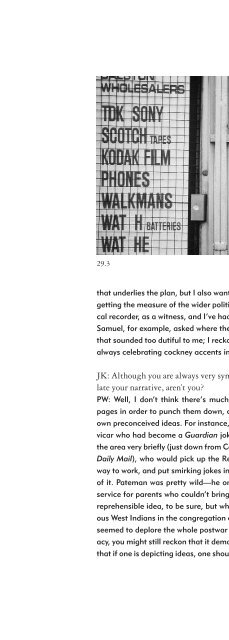The Unknown City: Contesting Architecture and Social Space
The Unknown City: Contesting Architecture and Social Space The Unknown City: Contesting Architecture and Social Space
29.3 The Last Days of London that underlies the plan, but I also wanted to use that street as a yardstick for getting the measure of the wider political culture. I wasn’t there only as a local recorder, as a witness, and I’ve had some arguments about this. Raphael Samuel, for example, asked where the celebration of local accents was, but that sounded too dutiful to me; I reckon there is quite a lot to be said for not always celebrating cockney accents in a mixed and diverse city like London. JK: Although you are always very sympathetic to the characters who populate your narrative, aren’t you? PW: Well, I don’t think there’s much point simply lifting people into your pages in order to punch them down, or merely using them to illustrate your own preconceived ideas. For instance, in A Journey Through Ruins there is a vicar who had become a Guardian joke. There was a journalist who lived in the area very briefly (just down from Cambridge, and already heading for the Daily Mail), who would pick up the Rev. Pateman’s parish magazine on the way to work, and put smirking jokes in the Guardian diary about the idiocies of it. Pateman was pretty wild—he once offered to provide a child-beating service for parents who couldn’t bring themselves to do it for themselves. A reprehensible idea, to be sure, but when you realize that there are many pious West Indians in the congregation of this hanging and flogging vicar who seemed to deplore the whole postwar period as one long slide into degeneracy, you might still reckon that it demands a more nuanced response. I think that if one is depicting ideas, one should also try to understand what their ra-
- Page 962: Port Statistics The United Kingdom
- Page 966: Port Statistics its defense by Ann
- Page 970: Notes 1 London, 35mm color, 85 min.
- Page 974: IMMATERIAL ARCHITECTURE Places are
- Page 978: Living in Wythenshawe largest in th
- Page 982: our lives, which we constantly adap
- Page 986: 28.3 28.4 green is closed (it would
- Page 990: selves so relatively powerless. 11
- Page 994: 28.7 Living in Wythenshawe other co
- Page 998: stituted a collective mirror more f
- Page 1002: Living in Wythenshawe the space of
- Page 1006: This page intentionally left blank
- Page 1010: Joe Kerr: This discussion is accomp
- Page 1016: Part IV: Tactical Filters 480 29 48
- Page 1020: Part IV: Tactical Filters 482 29 48
- Page 1024: Part IV: Tactical Filters 484 29 48
- Page 1028: Part IV: Tactical Filters 486 29 48
- Page 1032: Part IV: Tactical Filters 488 29 48
- Page 1036: Part IV: Tactical Filters 490 29 49
- Page 1040: Patrick Wright 30 Around the World
- Page 1044: Part IV: Tactical Filters 494 30 49
- Page 1048: Part IV: Tactical Filters 496 30 49
- Page 1052: Part IV: Tactical Filters 498 30 49
- Page 1056: Part IV: Tactical Filters 500 30 50
- Page 1060: Part IV: Tactical Filters 502 30 50
29.3<br />
<strong>The</strong> Last Days of London<br />
that underlies the plan, but I also wanted to use that street as a yardstick for<br />
getting the measure of the wider political culture. I wasn’t there only as a local<br />
recorder, as a witness, <strong>and</strong> I’ve had some arguments about this. Raphael<br />
Samuel, for example, asked where the celebration of local accents was, but<br />
that sounded too dutiful to me; I reckon there is quite a lot to be said for not<br />
always celebrating cockney accents in a mixed <strong>and</strong> diverse city like London.<br />
JK: Although you are always very sympathetic to the characters who populate<br />
your narrative, aren’t you?<br />
PW: Well, I don’t think there’s much point simply lifting people into your<br />
pages in order to punch them down, or merely using them to illustrate your<br />
own preconceived ideas. For instance, in A Journey Through Ruins there is a<br />
vicar who had become a Guardian joke. <strong>The</strong>re was a journalist who lived in<br />
the area very briefly (just down from Cambridge, <strong>and</strong> already heading for the<br />
Daily Mail), who would pick up the Rev. Pateman’s parish magazine on the<br />
way to work, <strong>and</strong> put smirking jokes in the Guardian diary about the idiocies<br />
of it. Pateman was pretty wild—he once offered to provide a child-beating<br />
service for parents who couldn’t bring themselves to do it for themselves. A<br />
reprehensible idea, to be sure, but when you realize that there are many pious<br />
West Indians in the congregation of this hanging <strong>and</strong> flogging vicar who<br />
seemed to deplore the whole postwar period as one long slide into degeneracy,<br />
you might still reckon that it dem<strong>and</strong>s a more nuanced response. I think<br />
that if one is depicting ideas, one should also try to underst<strong>and</strong> what their ra-



